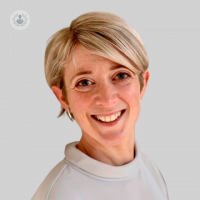Sleep apnoea: Should I have surgery?
Written by:Sleep apnoea is a sleep-related breathing disorder characterised by pauses in breathing during sleep, where your breathing stops for a short time and then starts again. While some people’s sleep apnoea can be managed with lifestyle changes or the use of a CPAP machine, others may require surgery to help improve their breathing.
Here to provide an expert insight into sleep apnoea surgery is Miss Lisa Greaney, renowned consultant oral and maxillofacial surgeon based in London.

When is surgery recommended for sleep apnoea?
Sleep apnoea surgery is indicated as a treatment option for:
- Patients who have moderate to severe sleep apnoea.
- Patients who have tried other treatments for sleep apnoea that have been unsuccessful.
- Patients who have a physical obstructing anatomy that is causing their sleep apnoea and that is surgically correctable.
Surgery for sleep apnoea works by increasing the size of the airway or by helping the airway to maintain its shape during sleep. In some cases, surgery may also be recommended to help increase the amount of airflow into the airway - for example, if a patient has large tonsils or adenoids.
What are the surgical options available? How is the most appropriate procedure selected?
There are several surgical procedures that can help improve obstructive sleep apnoea (OSA) and central sleep apnoea (CSA).
Some of the most common surgical options available for sleep apnoea include:
Uvulopalatopharyngoplasty (UPPP)
Removal of excess tissue in the upper airways, including the pharynx, the uvula, the soft and hard palates, as well as the tonsils if they are present. UPP is the most common surgical procedure performed for sleep apnoea.
Tonsillectomy
Removal of the tonsils.
Adenoidectomy
Removal of the adenoids.
Nasal surgery
The most common nasal surgeries are septoplasty and turbinate reduction, two outpatient procedures that improve sleep apnoea symptoms by enlarging the septum or the turbinates. This allows air to flow freely through them.
Skeletal surgery
Moving or reshaping bones in the face or the jaw.
Tongue surgery
Removal of part of the tongue, or, the insertion of a small screw to hold the tongue in place.
Tracheostomy
Insertion of a tube into the windpipe through a hole in the neck to avoid obstructions in the upper airway.
Pillar Procedure
A soft palate surgery that is recommended for mild cases of sleep apnoea. This procedure involves the placement of three rods made of plastic into the soft palate. The rods stimulate an inflammatory response in the soft palate tissue, helping to stiffen it.
Multilevel upper airway surgery
This procedure can help to reduce the frequency of sleep apnoea and daytime sleepiness.
Maxillomandibular advancement: Otherwise known as double-jaw surgery or bimaxillary advancement, this procedure moves the upper and lower jaw forward to relieve airway obstruction.
The best surgery for each patient will vary, depending on the type and the severity of the sleep apnoea, the existence or location of the airway obstruction, and the patient’s individual physical anatomy.
What are the potential risks associated with sleep apnoea surgery?
The risks of sleep apnoea surgery include:
- Excessive bleeding
- Infection
- Deep vein thrombosis
- Breathing problems
- Urinary retention
- Allergy to anaesthesia
Patients should carefully discuss the potential risks and benefits of sleep apnoea surgery with a surgeon before making a decision.
How long does it take to recover from sleep apnoea surgery?
The recovery time after sleep apnoea surgery can vary from patient to patient, depending on the type of procedure that is performed. Patients who undergo maxillomandibular advancement, for example, may have to remain in hospital for a day or two, and will need approximately two months to fully recover.
What is the success rate of sleep apnoea surgery? How can surgery help to improve my health and wellbeing?
Again, the success rate of sleep apnoea surgery can vary, depending on the type and the extent of the procedure. A successful operation, however, will reduce or eliminate snoring as well as sleep apnoea symptoms, leading to better sleep quality, improvement of mood and energy levels, and overall, a better quality of life.
Will I need to continue using treatments, such as a CPAP machine, after surgery?
After sleep apnoea surgery, patients may not need to use a CPAP machine anymore, depending on the type of procedure and the severity of their sleep apnoea. Some patients, however, may still need to use a CPAP machine following surgery.
Miss Lisa Greaney is a distinguished consultant oral and maxillofacial surgeon with over 15 years’ experience. If you require sleep apnoea surgery and you would like to consult your options with an expert, do not hesitate to book an appointment with Miss Greaney via her Top Doctors profile today.


